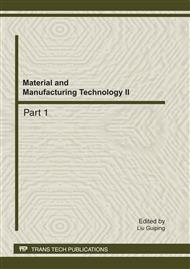p.490
p.494
p.499
p.504
p.509
p.514
p.519
p.524
p.530
Exact Outage Probability Analysis for Selection Decode-and-Forward Cooperation Systems
Abstract:
In this paper, we present a selection decode-and- forward (S-DF) cooperation scheme where only the “best” relay, which is selected as the one who can decode correctly its received signal from source node and can achieve the highest instantaneous signal-to-noise ratio (SNR) at the destination, participates in relaying the source’s signal. We derive a novel exact closed-form expression of outage probability for the S-DF scheme over Rayleigh fading channels, based on which an asymptotic outage analysis is further presented in high SNR regime, showing that given M potential relays, M+1 diversity order is achieved by source node. Consequently, the proposed S-DF scheme with the best relay selection can achieve the full diversity at the expense of just two channels only regardless of the number of candidate relays.
Info:
Periodical:
Pages:
509-513
Citation:
Online since:
September 2011
Authors:
Price:
Сopyright:
© 2012 Trans Tech Publications Ltd. All Rights Reserved
Share:
Citation:


